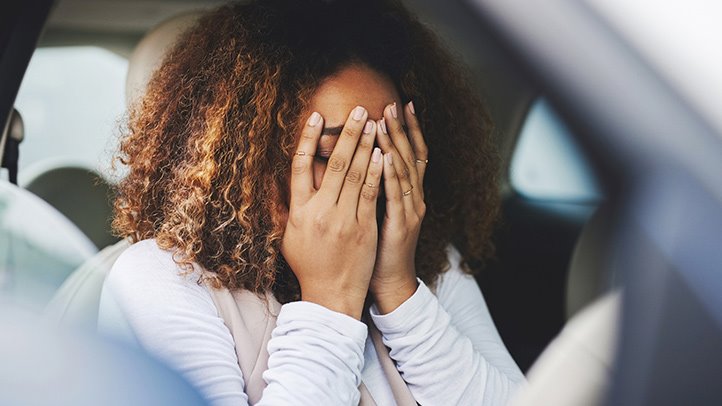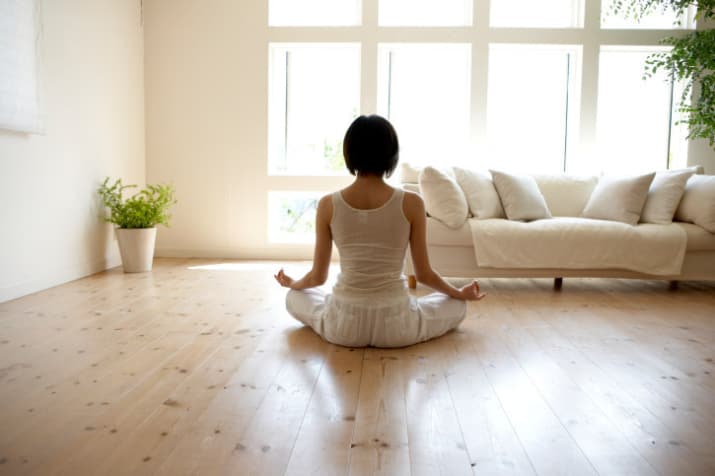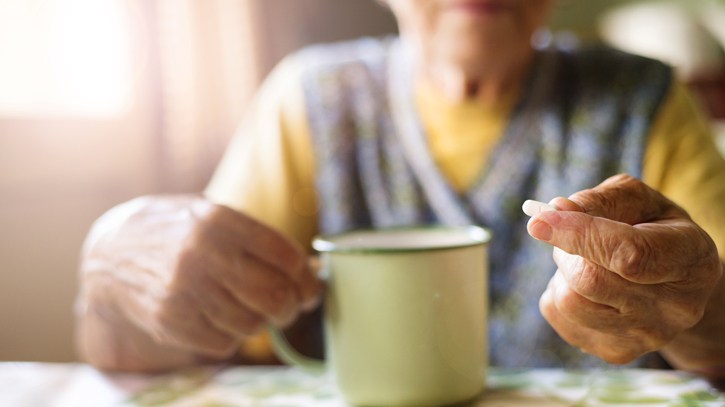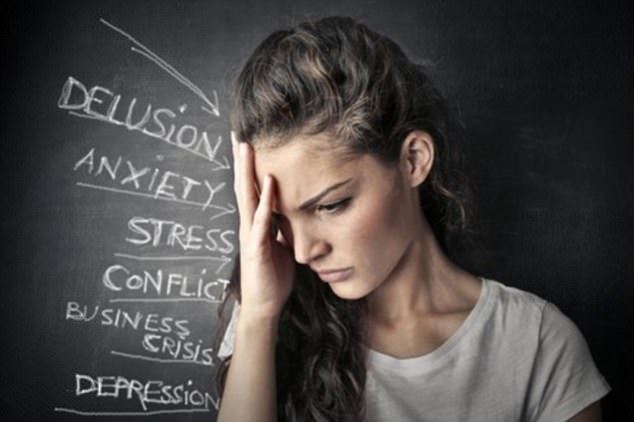Research has found that almost everyone will experience an anxiety (panic) attack at least once during his/her life. People who behave more anxiously than normal often experience many anxiety attacks. Some anxious people, approximately 3 percent of the general population, develop panic attack disorder (PAD) – when panic attacks become problematic and interfere with a normal lifestyle.
Anxiety attacks and panic attacks are the same thing.
Anxiety attacks are often characterized as experiencing:
- A feeling of overwhelming fear
- Feeling of going crazy or losing control
- Feeling you are in grave danger
- Feeling you might pass out
- A surge of doom and gloom
- An urgency to escape
- Dizziness
- Palpitations
- Trembling
- Sweating
- Shortness of breath
- Chest pressure or pain
- Turning pale
- Feeling detached from reality
- Weak in the knees
- Burning skin
- Pins and needles
- Hot and cold flushes
- Numbness and tingling sensationsThe above anxiety attack symptoms can be accompanied by:
- Choking sensation, tightening throat, it feels like your throat is closing, it feels like something is stuck in your throat
- Confusion
- Depersonalization (feeling detached from reality, separate from one-self, separate from normal emotions)
- Derealization (feeling unreal, in a dream-like state)
- Dizziness, lightheadedness, unsteadiness
- Emotional distress
- Emotional upset
- Inability to calm yourself down
- Knot in the stomach, tight stomach
- Nausea
- Panicky feeling
- Pounding, racing heart
- Butterflies in the stomach
- Sudden urge to go to the bathroom (urinate, defecate)
- Vomiting
- Feel like crying
You can experience one, many, or all of the symptoms listed above. Just because you aren’t experiencing many or all of the above symptoms doesn’t mean you aren’t having an anxiety attack. Each person can have a unique anxiety attack experience.
This list is not exhaustive. As you can see, there are many physical, psychological, and emotional signs and symptoms of an anxiety attack. For a more comprehensive list of anxiety symptoms and descriptions of what they feel like, visit our anxiety symptoms page.
Even though anxiety attacks can be powerful physical, psychological, and emotional experiences, they occur for specific reasons. Understanding these reasons can put you in control of anxiety attacks rather than anxiety attacks seeming like they are out of your control. Learning to control anxiety attacks can set you free from them.
Anxiety attacks
Anxiety: A state of apprehension, uncertainty, and fear resulting from the anticipation of a real or imagined impending threat.
In this regard, anxiety is caused by behaving in an apprehensive manner, such as worrying, imagining the worst, and fearing the worst.
You can learn more about anxiety on our “What causes anxiety?” page in our Anxiety 101 section.
When we behave apprehensively, the body activates the stress response, which causes the body to secrete stress hormones into the bloodstream where they travel to targeted spots in the body to bring about specific physiological, psychological, and emotional changes that enhance the body’s ability to deal with a threat—to either fight with or flee from it—which is the reason the stress response is often referred to as the fight or flight response or the emergency response.
The Stress Response is designed to ‘supercharge’ the body so that it is better equipped to deal with a threat. This supercharge ‘boost’ is a vital part of our survival mechanism. Consequently, the stress response is our ally when in real danger.
Whenever we believe we are in danger, the body activates a stress response. This is how the survival mechanism works.
As one of our anxiety clients noted, there are no freebies – meaning that the body ALWAYS produces a stress response when we think we are in danger. Just because we don’t feel the effects of a stress response doesn’t mean one didn’t happen. The stronger the response, the more we feel them.
If a person isn’t familiar with how the body’s emergency survival system works or how it is triggered, the stress response and the changes it causes can seem threatening and even frightening for people who are overly anxious. This is one of the reasons many people fear anxiety attacks…because they don’t understand them or know they can control them.
The degree of stress response is directly proportional to the degree of perceived threat.
As the degree of stress response increases, so does the intensity and magnitude of the changes the stress response brings about.
For example, if you conclude that a situation or circumstance isn’t going to be too dangerous, your body will produce only a small degree stress response, which results in slight physiological, psychological, and emotional changes. On the other hand, if you believe a situation or circumstance could be very dangerous, your body will produce a high degree stress response and powerful physiological, psychological, and emotional changes.
The degree of stress response and its associated physiological, psychological, and emotional changes are directly proportional to the degree of perceived threat. The more threatening the perceived threat seems, the more powerful the stress response.
What is an anxiety attack?
An anxiety attack is a high degree stress response activated by either overly apprehensive behavior (worrying/fearing something really bad may happen) or by the involuntary action of an overly stressed body.
In other words, anxiety attacks have two main causes:
Voluntary anxiety attacks: When we worry something really bad may happen and the body responds with a high degree stress response.
Involuntary anxiety attacks: When the body activates a high degree stress response due to persistently elevated stress.
Voluntary Anxiety Attacks:
Most anxiety attacks are voluntary anxiety attacks caused by overly apprehensive behavior: believing something really bad is about to happen, which activates a high degree stress response. Once the high degree stress response is activated, the physiological, psychological, and emotional changes that result can be powerful. These powerful changes, even though they are our ally, can seem like something really bad is happening, which many anxious people react to with more fear…which activates another stress response, and so on.
Reacting to anxiety attacks in a fearful way will keep anxiety attacks going.
In a sense, anxious personalities become afraid of what the high degree stress response feels like and/or believe that it is the harbinger of something dangerous, which causes more stress responses. This is often the scenario that sets up Panic Attack Disorder: becoming afraid of the feelings of a high degree stress response and believing they are uncontrollable.
In this regard, fear set off the initial anxiety attack and fearing the sensations associated with the anxiety attack activates more stress responses. We call this the ‘fear cycle’ – worry about/fear activates a high degree stress response = we worry about/fear the feelings of a high degree stress response = which activates another stress response, and so on.
Voluntary anxiety attacks account for approximately 98 percent of all anxiety attacks.
Involuntary Anxiety Attacks
The body has a number of systems that automatically (involuntarily) monitor and regulate each other moment by moment. When the body is healthy and not overly stressed, it does a good job of keeping all of its systems working normally.
When the body becomes overly stressed, however, it can sometimes mismanage systems, which can cause the body to behave erratically and more involuntarily than normal. This erratic and more involuntary behavior can cause the body to involuntarily activate the stress response. The great majority of ‘out-of-the-blue’ anxiety attacks are caused by this involuntary mismanagement.
Experiencing an involuntary panic can be unnerving. If a person doesn’t understand why the body produced an involuntary panic attack, he could react to it with more anxiety, which can cause more anxiety attacks.
As we mentioned earlier, reacting with fear to anxiety attacks is the most common reason why anxiety attacks persist.
Much more could be said. We’ve completely described anxiety attacks, their cause, and resolution in chapters 3, 5 and 6 in the Recovery Support area of our website.
Based on the above, here are 10 Top Ways to Stop Anxiety Attacks:
1. Understand the anatomy of an anxiety attack (understanding the physiological, psychological, and emotional components that contribute to anxiety attacks). – When you understand what anxiety attacks are; what causes them; how the body responds – the many physiological, psychological, and emotional changes that can occur and why; the many stages of the stress response; and how stress affects the body; anxiety attacks are no longer mysteries that have the potential to scare you. Becoming unafraid of anxiety attacks is the surest way to stop them. We explain the complete anatomy of an anxiety attack in Chapter 3 in the Recovery Support area of our website.
Having a complete understanding of anxiety attacks is the surest way to end a struggle with them. Knowledge is power. This knowledge will set you free from panic…for good!
2. Stop scaring yourself – As we mentioned above, anxiety attacks are mostly caused by being afraid. So being afraid of anxiety attacks is one of the most common reasons why anxiety attacks sustain…and why people develop Panic Attack Disorder. Since fear is the most common reason why anxiety attacks occur and persist, refusing to scare yourself removes the main reason anxiety attacks occur.
When you eliminate fear, you eliminate the most common cause of anxiety attacks. Yes, you can learn to stop scaring yourself. This is the second most powerful way to eliminate anxiety attacks.
For example, rather than thinking, “Oh my gosh, this is awful. What if I completely lose it?” Use more affirmative language such as, “Ok, this doesn’t feel good. But it’s just my body’s emergency response and it will end as I stop scaring myself.”
Or, instead of thinking, “This is awful. I can’t stand it!” Think, “This is what a high degree stress response feels like. Many people go to great lengths to feel this. It’s a normal part of the body’s survival mechanism. It’s not dangerous.”
Or, instead of thinking, “What’s causing this horrible feeling? What if I’m dying or having a complete breakdown?” Think, “This feeling can feel strong, but it’s not dangerous. All bodies react this way when we think we are in danger or are overly stressed. It’s not something to be concerned about. It will end soon and I’ll be fine again.”
Taking charge of your thinking puts you in control of your body’s emergency system. As you get proficient at taking control, you can completely shut down anxiety attacks and prevent them from starting.
3. Calm yourself down – Similar to point two, calming yourself down shuts off the mechanism that causes anxiety attacks. Calming yourself down ends the stress response. Then it’s just a matter of time until the body uses up or expels the remaining stress hormones.
The more you calm yourself down, the faster the anxiety attack will end and the sooner you’ll feel better. Keep in mind that the physiological, psychological, and emotional changes resulting from a minor stress response last for approximately a few to ten minutes. A high degree stress response can last for twenty to thirty minutes or more. You want to keep yourself calm until the body recovers from the active stress response. This means you may feel the physiological, psychological, and emotional changes in the meantime, but that they will all end as the body recovers from the active stress response.
Calming yourself down is another sure way to end, control, and prevent anxiety attacks.
4. Relaxed diaphragmatic breathing – Slow, relaxed, diaphragmatic breaths cause the body to trigger a natural tranquilizing effect. This tranquilizing effect counters the effects of the stress response. As you relax diaphragmatic breathe, your body will calm down, which again will end an anxiety attack.
Relaxed diaphragmatic breathing (slow breathing from your diaphragm) is another natural way to end, control, and prevent anxiety attacks.
5. Relax your body – Relaxing the body shuts off the stress response since the body can’t go in both (arousal/relaxed) directions at the same time. The more relaxed you make your body, the faster the body uses up and expels stress hormones, which will bring an end to the feelings associated with an active stress response.
Relaxing the body also offsets the muscle tension caused by the stress response. You can read more about that under the ‘muscle tension’ symptom.
6. Distract yourself – As we mentioned earlier, most anxiety attacks are caused and fueled by thinking anxiously. Distracting your attention can prevent anxious thinking. As you prevent anxious thinking you also prevent voluntary anxiety attacks.
There are lots of ways to distract yourself, such as counting, calling a friend, organizing materials on or in your desk, playing a game, reading a book, and so on. Anything that distracts your mind away from anxious thinking will indirectly end stress responses and anxiety attacks. The better you are at distracting yourself, the faster anxiety attacks end.
You might also want to distract yourself with more sensory experiences, such as with cold water, ice, strong tastes, touch, and so on. Strong sensory experiences are more distracting. Anything that takes your mind away from the sensations associated with the active stress response and thinking anxiously will assist in ending anxiety attacks.
7. Recognize all panic attacks end – No matter how powerful the anxiety attack, it will end. We can end them faster by doing some or all of the above. Nevertheless, all anxiety attacks end. It’s only a matter of time. No one experiences unending anxiety attacks even though sometimes it can feel that way. Riding out the anxiety attack knowing it will end can help you remain calm, which also shuts off the stress response and anxiety attack.
8. Recognize your body is doing what it’s supposed to in response to thinking you are in danger(survival mechanism and the stress response). Many people go to great lengths to experience the rush of the stress response (skydiving, bungee jumping, other dangerous and thrilling activities). So a high degree stress response isn’t a bad thing, but the body’s temporary emergency survival mechanism in action. We can shut it off anytime by using the above strategies.
9. Even though an anxiety attack may feel like it is out of control, it actually isn’t. Using the above strategies can put you in control…and every time. While it may take courage and practice initially, all of us can control anxiety and anxiety attacks. Knowing how to control anxiety attacks, and becoming practiced at it, eliminates them.
Moreover, even though you may feel you are in danger from an anxiety attack, you aren’t. An anxiety attack is a common response to believing you are in danger, but not the actual cause of being in danger.
10. Keep your body’s stress in check. – Keeping your body’s stress in the healthy range will prevent involuntary anxiety attacks. You will also have more control over your body’s reactions when stress is minimized (persistently elevated stress can cause the body to act erratically and more involuntarily than normal, which can affect the level of control you have over your physical, psychological, and emotional capacities).
Persistently elevated stress is the number one cause of involuntary anxiety attacks.
For more information about anxiety attacks and how to control them, see chapters 3, 4, 5, and 6 in the Recovery Support area of our website.
Panic Attack Disorder (Panic Disorder) is one of the easiest anxiety disorders to eliminate when you know how. No one needs to suffer needlessly. You can eliminate anxiety attacks naturally by knowing how and through practice.
Chapter 6 in the Recovery Support area has a complete section on how to overcome Panic Disorder as well as how to extinguish a fear of anxiety attacks.
The combination of good self-help information and working with an experienced anxiety disorder therapist, coach, or counselor is the most effective way to address anxiety and its many symptoms. Until the core causes of anxiety are addressed – we call these core causes the underlying factors of anxiety – a struggle with anxiety unwellness can return again and again. Dealing with the underlying factors of anxiety is the best way to address problematic anxiety.





